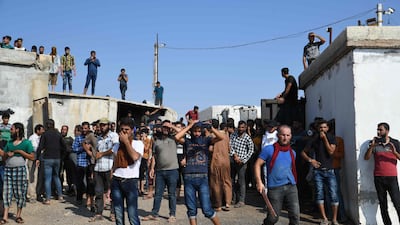Turkish President Tayyip Erdogan said on Tuesday that a so-called de-escalation zone in Syria's Idlib region is slowly disappearing because of military attacks by government forces.
Mr Erdogan also said he would make all necessary contacts with parties in the region to find a solution to the Idlib situation, adding that a Syria safe zone which he has proposed to host Syrians fleeing the war is now nothing more than a name.
"Idlib is slowly disappearing. Idlib is in a situation that it started to disappear and become torn down in a way Aleppo is. It is not possible to stay silent against this," Mr Erdogan told a news conference in Ankara.
Idlib, in Syria's northwest corner, is the only big chunk of the country still in rebel hands after over eight years of war.
Turkey, Russia and Iran agreed in 2017 to the Idlib zone to reduce fighting, although the terms were never made public and the deal did not include extremist Islamist groups.
A truce in early August collapsed three days in, after which the Russian-backed Syrian army pressed an offensive and gained ground against rebel forces, some of whom are backed by Turkey.
A fragile ceasefire has held in the Idlib region since Saturday, following four months of air strikes that have killed hundreds of civilians and caused mass displacement.
An estimated three million people are living in Idlib almost half of whom have been displaced from other parts of Syria in the country's eight-year war.
Children make up nearly half of the region's total population, the United Nations says, and are at particular risk, with thousands missing out on their education.
The heavy bombardment has damaged or impacted 87 educational facilities, according to Britain-based NGO Save the Children.
"Thousands of children due to start the school year in northwest Syria may not have access to education" after the latest violence, the charity said.
Classes are set to start at the end of September, but just over half of the region's 1,193 schools can still operate, it said.
"As the new school year starts, the remaining functional schools can only accommodate up to 300,000 of the 650,000 school-age children," it said.
A further 200 schools are being used as shelters for those displaced by the fighting, it added.
Violence since April has killed more than 960 civilians, according to the Syrian Observatory for Human Rights, and displaced more than 400,000 people, the UN says.
After bombardment damaging schools or forcing them to close, many parents are scared to send their children to those still open, Save the Children said.
"Teachers are telling us that parents are pleading with them to shut schools for fear of them being attacked," the group's Syria country director Sonia Khush said.
"Many children are dealing with losing their homes, loss and grief. They should not have to fear losing their lives whilst they try to learn," she added.
Idlib has since January been ruled by Hayat Tahrir Al Sham, an alliance led by Syria's former Al Qaeda affiliate.
Syria's conflict has killed more than 370,000 people and displaced more than half of the country's pre-war population since starting in 2011 with the brutal repression of anti-government protests.
On Saturday, the US Central Command, part of the Department of Defence, said US forces struck an Al Qaeda facility in Idlib in an attack aimed at the organisation's leadership.
Mr Erdogan said that Idlib would be the most important issue during his meeting with US President Donald Trump as part of the United Nations General Assembly later in September.
A proposed safe area in northern Syria to host displaced Syrians is not supported by some allies, Mr Erdogan said.
"Safe zone is nothing more than a name right now. Some assaults, threats are made in the southern part but we are taking all the necessary steps," Mr Erdogan said.

